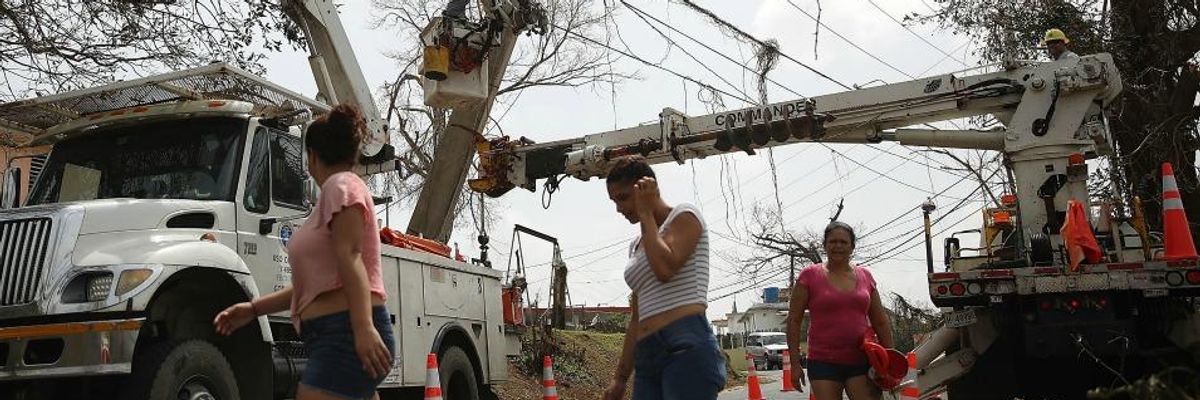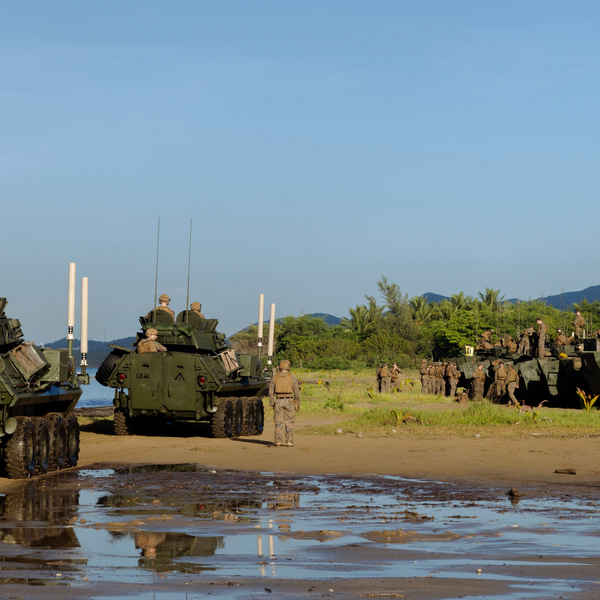
PREPA has been criticized for its mismanagement of Puerto Rico's recovery from Hurricane Maria, with 30 percent of the island still without power four months later. (Photo: Joe Raedle/Getty Images)
Disaster Capitalism in Action as Puerto Rico Governor Announces Plan to Privatize Power Utility
"Whether it's water or energy, privatization helps Wall Street at the expense of the wellbeing and health of communities."
Critics on Monday called Puerto Rican Governor Ricardo Rossello's plan to privatize the island's electricity authority a development that exemplifies the prevalence of "disaster capitalism"--the liberalization and corporatization of economies following destructive events like last September's Hurricane Maria, which devastated the island.
Wenonah Hauter of Food & Water Watch called the decision "catastrophic" and indicative of the same pattern of the Trump administration prioritizing wealthy companies that aim to take over public services.
"The decision to privatize Puerto Rico's state-owned power company follows the same dangerous path mapped out in the Trump administration's draft infrastructure plan," said Hauter. "Whether it's water or energy, privatization helps Wall Street at the expense of the wellbeing and health of communities, particularly low-income families and people of color."
Naomi Klein, who has written extensively about the phenomenon of disaster capitalism, said on Twitter that the decision is troubling but unsurprising.
I'm in Puerto Rico now and it's not really a surprise, they have been laying the groundwork for this for years. The chaos post-storm was the perfect opening. https://t.co/huTGzD8voQ
-- Naomi Klein (@NaomiAKlein) January 22, 2018
Intercept reporter Kate Aronoff agreed that the destruction caused by last year's hurricane has provided Rossello with an opportunity to sell the Puerto Rico Electric Power Authority's (PREPA) assets to various private companies, allowing them to operate without the regulatory oversight used for public entities.
\u201cAnd there it is: It took a few months, but Hurricane Maria finally gave Rossello and likely the fiscal control board the excuse they needed to move forward with privatizing PREPA https://t.co/o1XUeKOq3x\u201d— Kate Aronoff (@Kate Aronoff) 1516658850
\u201cReminder that Rossello is looking to sell off various pieces of PREPA *at the same time* as he's trying to get rid of the only regulatory check on it, which, combined, could be an absolute disaster.\u201d— Kate Aronoff (@Kate Aronoff) 1516658850
Four months after the hurricane, about 30 percent of the island is still without power. In addition to gross mismanagement by the Trump administration, PREPA has also been blamed for the slow recovery. In November, the agency's director was forced to resign due to failures that included a short-lived rebuilding contract that was given to a tiny Montana-based energy company with connections to Interior Secretary Ryan Zinke.
Utility workers also accused the government of hoarding supplies needed for the recovery, and union officials have argued that PREPA has intentionally sabotaged efforts to repair the electric grid in order to pave the way to privatization.
Rossello argued on Monday that PREPA has become "a heavy burden for our people, who today are held hostage by its poor service and high cost," referring to Puerto Rico's frequent blackouts even before Hurricane Maria and Puerto Ricans' power bills, which on average are twice as high as those on the mainland.
"The deficient and obsolete system of generation and distribution of energy is one of the great impediments to our economic development," Rossello added.
But critics including Sen. Juan Dalmau of the Puerto Rican Independence Party argued that privatization would likely hold few benefits for customers and argued that the territory's leaders were taking advantage of residents' desperation for any improvement after the devastating storm.
"The message is a manipulation of the justified hopelessness of an island facing a lack of power after the hurricane," Dalmau said.
Instead of privatizing and deregulating the island's energy system, Hauter argues the Puerto Rico government has much better options.
An Urgent Message From Our Co-Founder
Dear Common Dreams reader, The U.S. is on a fast track to authoritarianism like nothing I've ever seen. Meanwhile, corporate news outlets are utterly capitulating to Trump, twisting their coverage to avoid drawing his ire while lining up to stuff cash in his pockets. That's why I believe that Common Dreams is doing the best and most consequential reporting that we've ever done. Our small but mighty team is a progressive reporting powerhouse, covering the news every day that the corporate media never will. Our mission has always been simple: To inform. To inspire. And to ignite change for the common good. Now here's the key piece that I want all our readers to understand: None of this would be possible without your financial support. That's not just some fundraising cliche. It's the absolute and literal truth. We don't accept corporate advertising and never will. We don't have a paywall because we don't think people should be blocked from critical news based on their ability to pay. Everything we do is funded by the donations of readers like you. Will you donate now to help power the nonprofit, independent reporting of Common Dreams? Thank you for being a vital member of our community. Together, we can keep independent journalism alive when it’s needed most. - Craig Brown, Co-founder |
Critics on Monday called Puerto Rican Governor Ricardo Rossello's plan to privatize the island's electricity authority a development that exemplifies the prevalence of "disaster capitalism"--the liberalization and corporatization of economies following destructive events like last September's Hurricane Maria, which devastated the island.
Wenonah Hauter of Food & Water Watch called the decision "catastrophic" and indicative of the same pattern of the Trump administration prioritizing wealthy companies that aim to take over public services.
"The decision to privatize Puerto Rico's state-owned power company follows the same dangerous path mapped out in the Trump administration's draft infrastructure plan," said Hauter. "Whether it's water or energy, privatization helps Wall Street at the expense of the wellbeing and health of communities, particularly low-income families and people of color."
Naomi Klein, who has written extensively about the phenomenon of disaster capitalism, said on Twitter that the decision is troubling but unsurprising.
I'm in Puerto Rico now and it's not really a surprise, they have been laying the groundwork for this for years. The chaos post-storm was the perfect opening. https://t.co/huTGzD8voQ
-- Naomi Klein (@NaomiAKlein) January 22, 2018
Intercept reporter Kate Aronoff agreed that the destruction caused by last year's hurricane has provided Rossello with an opportunity to sell the Puerto Rico Electric Power Authority's (PREPA) assets to various private companies, allowing them to operate without the regulatory oversight used for public entities.
\u201cAnd there it is: It took a few months, but Hurricane Maria finally gave Rossello and likely the fiscal control board the excuse they needed to move forward with privatizing PREPA https://t.co/o1XUeKOq3x\u201d— Kate Aronoff (@Kate Aronoff) 1516658850
\u201cReminder that Rossello is looking to sell off various pieces of PREPA *at the same time* as he's trying to get rid of the only regulatory check on it, which, combined, could be an absolute disaster.\u201d— Kate Aronoff (@Kate Aronoff) 1516658850
Four months after the hurricane, about 30 percent of the island is still without power. In addition to gross mismanagement by the Trump administration, PREPA has also been blamed for the slow recovery. In November, the agency's director was forced to resign due to failures that included a short-lived rebuilding contract that was given to a tiny Montana-based energy company with connections to Interior Secretary Ryan Zinke.
Utility workers also accused the government of hoarding supplies needed for the recovery, and union officials have argued that PREPA has intentionally sabotaged efforts to repair the electric grid in order to pave the way to privatization.
Rossello argued on Monday that PREPA has become "a heavy burden for our people, who today are held hostage by its poor service and high cost," referring to Puerto Rico's frequent blackouts even before Hurricane Maria and Puerto Ricans' power bills, which on average are twice as high as those on the mainland.
"The deficient and obsolete system of generation and distribution of energy is one of the great impediments to our economic development," Rossello added.
But critics including Sen. Juan Dalmau of the Puerto Rican Independence Party argued that privatization would likely hold few benefits for customers and argued that the territory's leaders were taking advantage of residents' desperation for any improvement after the devastating storm.
"The message is a manipulation of the justified hopelessness of an island facing a lack of power after the hurricane," Dalmau said.
Instead of privatizing and deregulating the island's energy system, Hauter argues the Puerto Rico government has much better options.
Critics on Monday called Puerto Rican Governor Ricardo Rossello's plan to privatize the island's electricity authority a development that exemplifies the prevalence of "disaster capitalism"--the liberalization and corporatization of economies following destructive events like last September's Hurricane Maria, which devastated the island.
Wenonah Hauter of Food & Water Watch called the decision "catastrophic" and indicative of the same pattern of the Trump administration prioritizing wealthy companies that aim to take over public services.
"The decision to privatize Puerto Rico's state-owned power company follows the same dangerous path mapped out in the Trump administration's draft infrastructure plan," said Hauter. "Whether it's water or energy, privatization helps Wall Street at the expense of the wellbeing and health of communities, particularly low-income families and people of color."
Naomi Klein, who has written extensively about the phenomenon of disaster capitalism, said on Twitter that the decision is troubling but unsurprising.
I'm in Puerto Rico now and it's not really a surprise, they have been laying the groundwork for this for years. The chaos post-storm was the perfect opening. https://t.co/huTGzD8voQ
-- Naomi Klein (@NaomiAKlein) January 22, 2018
Intercept reporter Kate Aronoff agreed that the destruction caused by last year's hurricane has provided Rossello with an opportunity to sell the Puerto Rico Electric Power Authority's (PREPA) assets to various private companies, allowing them to operate without the regulatory oversight used for public entities.
\u201cAnd there it is: It took a few months, but Hurricane Maria finally gave Rossello and likely the fiscal control board the excuse they needed to move forward with privatizing PREPA https://t.co/o1XUeKOq3x\u201d— Kate Aronoff (@Kate Aronoff) 1516658850
\u201cReminder that Rossello is looking to sell off various pieces of PREPA *at the same time* as he's trying to get rid of the only regulatory check on it, which, combined, could be an absolute disaster.\u201d— Kate Aronoff (@Kate Aronoff) 1516658850
Four months after the hurricane, about 30 percent of the island is still without power. In addition to gross mismanagement by the Trump administration, PREPA has also been blamed for the slow recovery. In November, the agency's director was forced to resign due to failures that included a short-lived rebuilding contract that was given to a tiny Montana-based energy company with connections to Interior Secretary Ryan Zinke.
Utility workers also accused the government of hoarding supplies needed for the recovery, and union officials have argued that PREPA has intentionally sabotaged efforts to repair the electric grid in order to pave the way to privatization.
Rossello argued on Monday that PREPA has become "a heavy burden for our people, who today are held hostage by its poor service and high cost," referring to Puerto Rico's frequent blackouts even before Hurricane Maria and Puerto Ricans' power bills, which on average are twice as high as those on the mainland.
"The deficient and obsolete system of generation and distribution of energy is one of the great impediments to our economic development," Rossello added.
But critics including Sen. Juan Dalmau of the Puerto Rican Independence Party argued that privatization would likely hold few benefits for customers and argued that the territory's leaders were taking advantage of residents' desperation for any improvement after the devastating storm.
"The message is a manipulation of the justified hopelessness of an island facing a lack of power after the hurricane," Dalmau said.
Instead of privatizing and deregulating the island's energy system, Hauter argues the Puerto Rico government has much better options.

